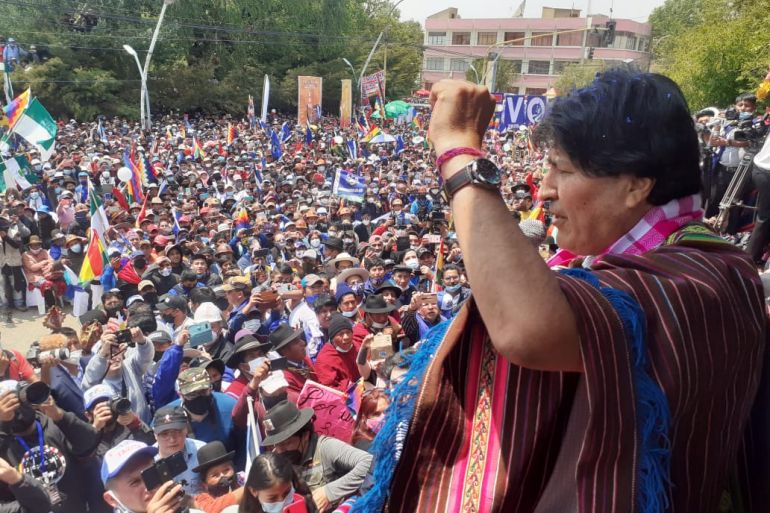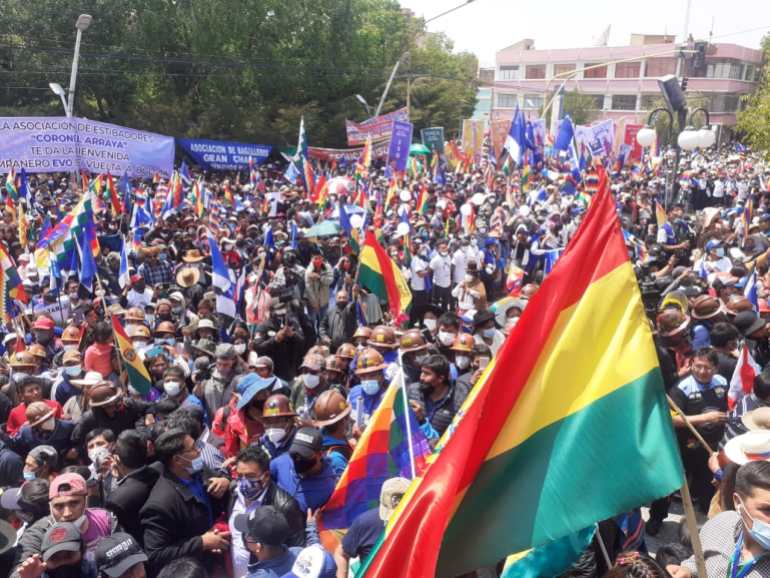Evo Morales returns to Bolivia from exile in Argentina
Thousands of cheering and flag-waving supporters welcomed Morales in Bolivia a year after he was removed from power.

Former longtime Bolivian leader Evo Morales crossed the border back into Bolivia on Monday, ending a year in exile, one day after a close ally and member of his MAS leftist party was sworn in as president.
Morales, who led Bolivia for almost 14 years as the first Indigenous president, entered the country from Argentina after a farewell ceremony presided over by Argentine President Alberto Fernandez.
Keep reading
list of 4 itemsBolivia sees more unrest following opposition leader’s arrest
Clashes in Bolivia after judge orders opposition leader detained
Census delay sparks deadly strikes in Bolivia’s Santa Cruz region
“I had no doubt that I would return (to Bolivia),” he told a large crowd of supporters who came to welcome him in the city of Villazon, which borders Argentina, “but I did not imagine that it would be so soon – something so historic and so unprecedented,” he said.

Morales, who left Bolivia under a cloud of suspicion in November 2019 after international observers cited irregularities in an election that gave him a fourth term in office, said that being able to return filled him “with happiness”.
“Today is one of the most important days of my life, to be returning to the country that I love so much fills me with happiness,” he wrote on Twitter.
Hoy es un día importante en mi vida, volver a mi patria que tanto quiero me llena de alegría. pic.twitter.com/BFaUzRGJiu
— Evo Morales Ayma (@evoespueblo) November 9, 2020
These findings have since been disputed, and he has maintained that he was the victim of an orchestrated coup.
Last month, new President Luis Arce said that Morales will play no role in his government.
Morales crossed the border from Argentina, where he has been living in exile, at 9am ET (14:00 GMT) and is expected to head to his rural stronghold, Chapare in central Bolivia.
Around 2,000 supporters, including members of Argentine social and political groups, gathered at the La Quiaca crossing on Monday morning to see him off.
Videos published on social media showed supporters cheering and chanting Morales’s name while waving the flags of the Indigenous people, and playing music on traditional instruments.
Fernandez told the crowd that the electoral turmoil in Bolivia reminded all Latin Americans about the need for regional solidarity. “We are part of a large nation,” he said. “We don’t want countries for some, we want countries for all. It is the duty of all of us to stand up for threatened peoples.”
On the Bolivian side of the frontier, in Villazon, a far bigger crowd was waiting to welcome its exiled former leader.
Estoy muy agradecido con el pueblo boliviano por recibirme con tanto cariño. pic.twitter.com/Ba0bJYPcu7
— Evo Morales Ayma (@evoespueblo) November 9, 2020
Morales took part in an Indigenous blessing ceremony before heading to address the large crowds gathered in the border town.
After 11 months of caretaker government, Arce, 57, won elections in October by a landslide and was sworn in as president on Sunday in a ceremony in the highland city of La Paz in front of heads of state from Argentina, Paraguay, Colombia and Spain, as well as senior officials from Chile, Iran and the government of Venezuela’s Nicolas Maduro.
The reserved former economy minister, feted as the architect of Bolivia’s rapid growth under Morales, vowed to “defeat” the coronavirus pandemic, “put an end to fear” after deadly electoral violence last year, and generate growth following the blow dealt by COVID-19 lockdowns.